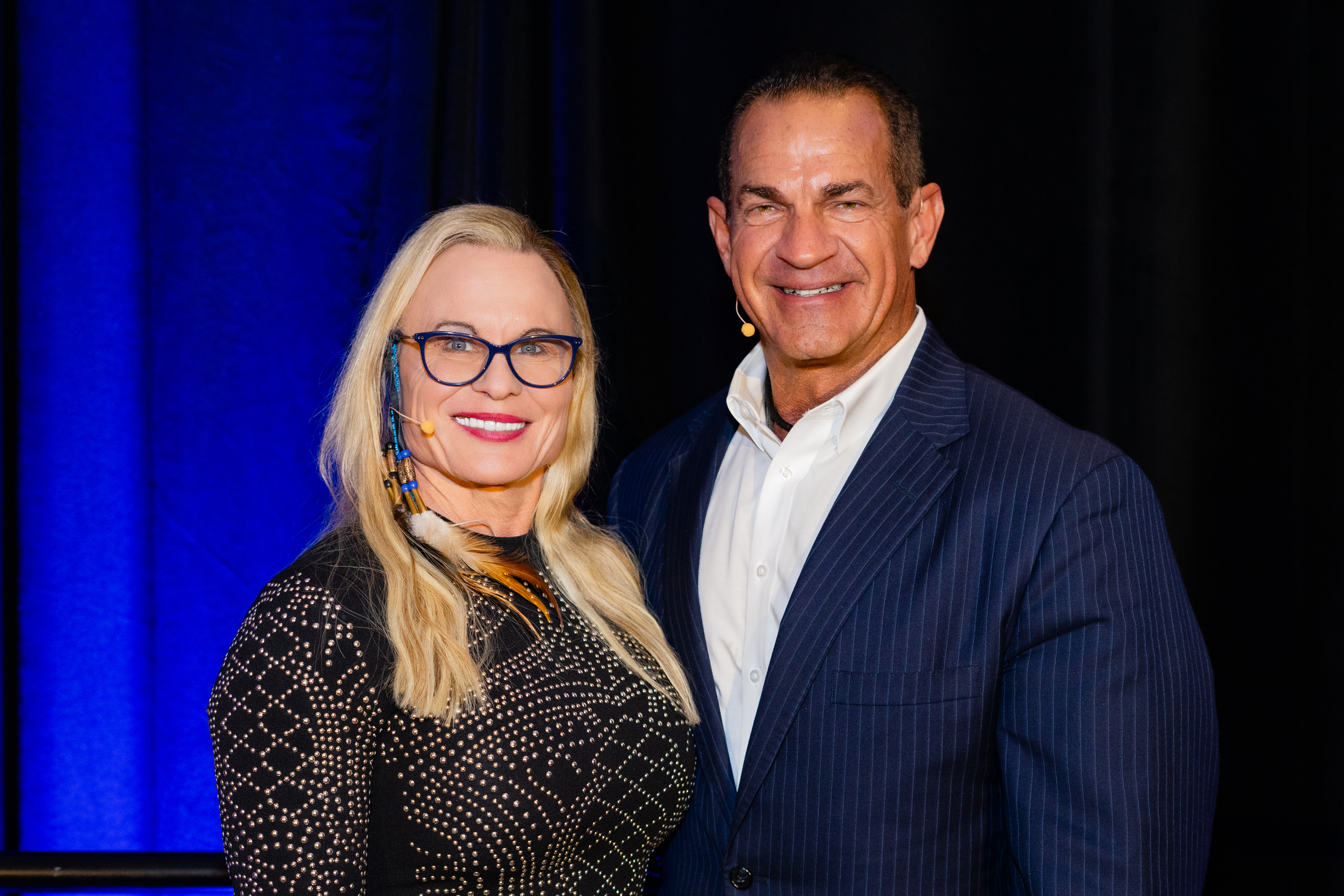Health Myths, Pillars of Wellness and Making Lasting Habits With Dr Rock

50 years of massive diet and fitness trends did not produce any healthy nations, mostly because they are unsustainable for people. Find out how to make habits you won't abandon.

Dr Julia Jones is a staple in the longevity industry. She’s not just a neuroscientist, author, and DJ, she’s also helping people across the country hack their biology and live healthier and longer lives. Find out her 3 pillars of wellness and what made her change her mind about the ways she views fitness.
Let's start with a few truth or myth questions.
Truth or myth - fitness and wellness are the same thing.
They are not the same thing. We thought they were the same thing. They're part of the equation, not solving the equation.
Truth or myth - regular stress is essential.
Well in the way that we are designed to receive it. Acute stress, not chronic.
Truth or myth - processed meat is less harmful than asbestos and nicotine.
Myth. I can't believe that there aren't warnings on these food products yet, but I'm sure that will happen in the coming years.
Truth or myth- walking 10,000 steps a day is a myth.
It is a myth.
I was mind-blown when I read that in your book. I couldn't believe it was such a random little marketing trick that grew into this global thing.
There's some recent research now looking at significant effects from just a few thousand steps a day. I mean, we need to be standing up, and moving around frequently throughout the day. That's the key.
But yeah, it was a great marketing campaign that grew like the Mozart effect. Have you heard of the Mozart effect?
No, what is it?
So decades ago, the media got hold of a research project. The researchers played Mozart to kids and then tested their results on some academic cognitive tests and found that they did better if they had listened to Mozart than if they hadn't.
So all the media went - all your children must listen to Mozart. But it was a music effect, you know, they just happened to be using Mozart. If they'd played some Ed Sheeran it would have been the Ed Sheeran effect or the Dua Lipa effect, but everyone was convinced that Mozart is amazing for children's brains.
Ahahahahah, now I know why so many of my peers used to study with classical music in the background. And the last truth of myth question - committing to a single habit over 12 months can severely impact your wellness.
Well, depending on what the habit is, it can positively impact your wellness. If it's something that targets your underlying biology in a good way and optimises it then sure. But if it's a habit that is negatively impacting your cellular functioning, then it's bad.
You are a pioneer in the longevity industry, and you've seen a lot of trends as well as established schools of thought come and go. What do we know now about fitness and over-exercising that we didn't know before?
The main finding in my research over the last few years, basically is that 50 years of massive diet and fitness trends did not produce any healthy nations because they are unsustainable for most people.
In order for them to work, you have to force yourself to do those things because they're restrictive and they don't align with the underlying biological circuits that we've got. And when you have to force yourself to do something that’s very hard, you’re setting yourself up for failure.
So looking at very small habit hacks now seems to be the most likely solution in terms of maintaining health across the life course, rather than just joining a gym in January, going for a little while and then not bothering.
It's much better to try and establish a routine with some really simple habits and then just make that your new normal, and that's fine.
If we go back to the beginning, I started as a sport and exercise scientist in the early 90s and I worked with Olympic squads and chains of health clubs. And so I was very involved in that world for over a decade and it grew massively. It's a brilliant business plan. And those fitness protocols were taken out of elite sport and they were repackaged for the general public.
So there is scientific evidence that underpins them. So if you do certain exercise routines and and do them effectively, then they have positive benefits. But the way that we have delivered it to the public is quite misleading because firstly, it's impossible for them to maintain. It's very expensive to maintain a gym membership and a lot of people are doing the wrong thing.
Some of our clients are over-exercising, basically just piling more stress into an already stressed body. They are going to gyms and doing fitness after work, trying to squeeze it in after stressful days, but they’re harming their bodies by putting them in artificially, brightly lit environments with pounding music that hyper-stimulates the sympathetic nervous system and leads to eating badly late at night.
That kind of practice will undoubtedly result in increases in fitness parameters. So they’ll build muscle mass and power but it will take a toll on the wellness pillars. It's not helping your gut diversity, it's not helping your sleep quality, and we’ve seen how all that negatively impacts biological ageing through the GlycanAge test.
I’ve had clients in their mid-50s who are senior executives who have a stressful life but are very proud that they've managed to squeeze in 3 or 4 gym workouts a week after work. And of course, they're biologically 20 years older than their chronological age. So it's time to really rethink what we're telling people.
Where I've landed on all of this is that if it's not a sustainable practice that you can make a habit for your entire life, then it's only going to really benefit you for a short amount of time. So it's about moderation, isn't it?
Definitely. How do you manage those clients who think that they're doing the most amazing thing for their bodies, but then you have to show them how much damage they’ve been doing instead?
Well, they're horrified. They think that they’re fit. And this is the problem - people think that fitness is wellness.
So fitness is something different and if done properly, can be a part of the overall solution. But mainly I take people on an education journey. That's what I've been trying to do with the books and online courses, because most people know more about how to operate their smartphones, than how to operate their bodies.
There is a very low level of literacy about human biology amongst the majority of the population. So when I start explaining to them -
- how the biological circuits are wired
- why the time of day that you see daylight is very important
- the way that you breathe is very important
- the thoughts that you have are very important
So it's very much an educational journey that I take them on.
A lot of people in the longevity space talk about the benefits of juicing, but you are not a fan. Can you explain the downsides of fruit juice?
This decade, we've learned so much about nutrition and the gut and obviously found loads of new bacteria that we never knew existed and have a whole different understanding of what those bacteria do. They're not just little hotel residents living inside the gut. They're actually workers creating metabolites and creating substances that we then use for our own metabolism and immune system and everything else.
But when it comes to the digestion of different foods, we know that fibre is really critical. And when you see someone downing a pint of orange juice compared to eating that orange, they're missing out on all that fibrous content. The content that goes in the small intestine helps to slow down the speed of absorption of all that glucose into the bloodstream.
We now know because of continuous glucose monitoring and everything else what happens - you get a massive insulin spike. That's something that we need to avoid in the way we consume our foods. And so I tend to use the rule of thumb - try and eat it as nature produced it.
Less human interference because as humans, we tend to just stick our fingers in and mess around with things, and that's not how these systems have been designed to work. So juicing is just another fad that came through.
In your new book, you mentioned self-hypnosis recordings. Can you explain what those are?
I started using these in the early 90s. I visited a US naval base in the early 90s, and they showed me how they were using music and sound as a bio-hack to reduce anxiety, boost sleep quality, increase exercise endurance, change mood and boost motivation.
I was a stellar musician, so I found this really fascinating. When I started, I was also lecturing in sports science and did my master's research looking at the effects of music and sound on exercise performance. When you start looking at how people react to music, you see that their brain synchronizes to the rhythms it hears.
The sounds that enter your brain can be very helpful in slowing down your breath, and extending your exhales, which triggers the parasympathetic branch of the autonomic nervous system through the vagus nerve. I'm actually in the process of creating new music formats with Universal Music around this principle.
When you think about it, what the brain hears is very powerful. And so when you think about self-hypnosis, it’s just walking you through those steps.
So a guided self-hypnosis recording would just be a voice, someone giving the guided instructions of slowing down your breath, visualization, and slowing your brainwaves down. Basically, you're optimizing the parasympathetic nervous system. And some people can do that on their own, without any guide, but some people can't.
Because we live in this hyper-stimulated environment now where the sympathetic branch of our autonomic nervous system is just being triggered, it's really detrimental to us, biological creatures not meant to be living in that sort of way.
Can you tell us a bit about your new product, Hack Coffee?
Through all the research, I've tried loads of different biohacking devices, products and apps and the only things that are most likely to be adopted for an entire lifetime are habits you already have.
So you're not asking someone to try and create a new habit, which takes a lot of effort. You’re asking them to make adjustments to their daily routine.
That’s why I joined the University of Greenwich Food Innovation Accelerator program, and we created a coffee that has prebiotic fibre in it because most people are very deficient in it. Prebiotic fibre is what our microbes need to thrive and exist in the gut.
So we looked at it from the position of - people drinking coffee every day. They're already doing it. We’re not asking them to create a new habit. You're just asking them to make a switch to a coffee that is fortified with additional ingredients that help boost health.
It’s coming out in November. It's instant coffee because again, when we look at the type of coffee most people drink is instant coffee because it's very convenient.
In your next project - Hackathon, you'll prove that small habit adjustments can reverse the damage and reduce the risk of future chronic disease. Can you take us through the process and explain how you'll track the progress of your participants?
So over the last three years, I've been working with a lot of corporate employers, as well as just general consumers online, and just following them through the journey to see how they succeeded or did not succeed in trying to make changes to their lifestyles.
Not just changes for a month or two, but creating a new normal. And it became really clear that most people will fail. I mean, that's the reality. Last week I was presenting at the British Society for Lifestyle Medicine, and had a thousand doctors and medical professionals there, and they all know that they've been telling people to eat better and move more for generations. And it hasn't worked.
The diet and fitness industry revenues have grown over 50 years. So has the average waistline size and so has the size of the health problem.
Those things don't work because they're high effort and also because people need support. It's very difficult to make a change on your own, especially if you're living in a household where other people don't make the change.
It's bordering on impossible for most people to do that. And so the approach we've now landed on is - we've identified 3 habits that most people were able to make their new normal.
The first one is eating within an 8 to 10-hour window. Basically, not eating late at night and early in the morning. So you're trying to extend that period overnight so that you're entering a fasting state.
We know there are benefits to that and people found it really easy to do. And it does automatically produce a calorie deficit for some people as well because you're eating less simply because you're eating within a shorter time frame.
So it doesn’t just have an impact on weight management, but also general metabolism and energy. Stress, sleep and weight management all interact with each other, as you know, so you’re not just targeting one, but all of them.
The second one is sun exposure. It’s important to get early morning exposure to daylight to optimise the circadian system and the neurons that are responsible for that kind of circuitry, and then try to not mess that up at night by bright light exposure.
So getting early natural daylight exposure and then really thinking about the light that you put into your eyes in the evening - using dimmed lighting, trying not to use mobile devices and screens and things like that. If you are using those, try and optimize the way you do it so it's not screaming bright lights into you.
The third one is breathing. Just slowing down your breath intentionally throughout the day trying to extend exhales to get to that resonance frequency breathing - down to six breaths per minute.
The beauty of all of these is that they don't cost anything because it costs nothing to breathe differently. It costs nothing to eat at a different time of day, and it costs nothing to go out and look at the natural outdoor environment to get the right type of light activating these cells. These habits are likely to be sustained throughout a lifetime because they don't cost anything and don't require a lot of effort.
I’m sure we’ll see noticeable differences in their health with these three habits. So after they finish the program, we'll meet them a year later and see all of the long-term benefits.
Sounds amazing and we can’t wait to hear about all the amazing results. Find out more about Dr Julia Jones here.



